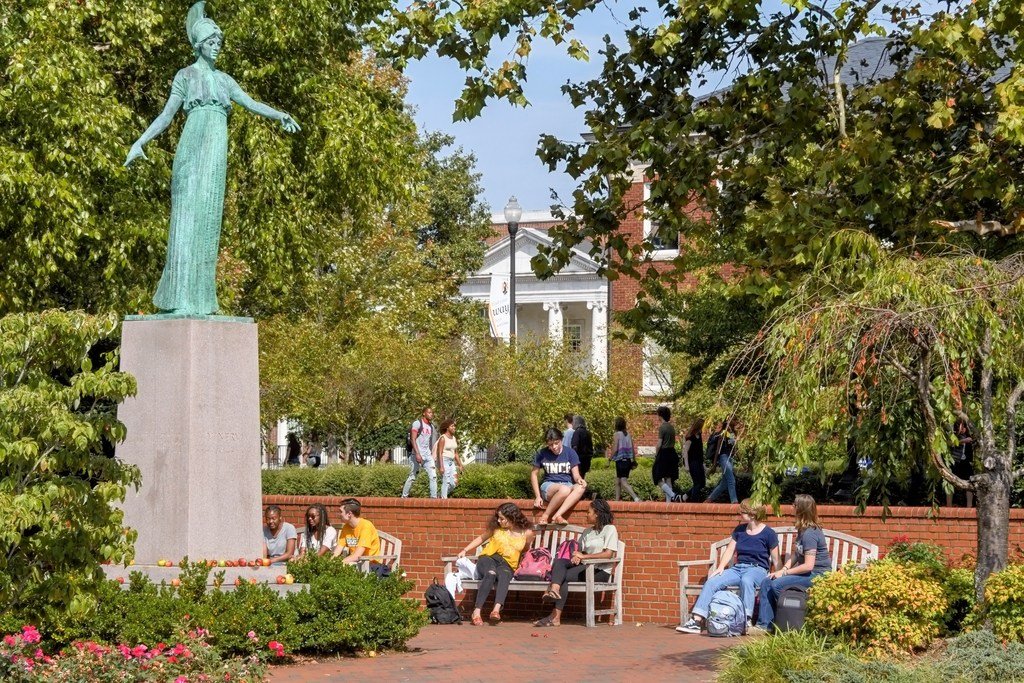“A Republic Wrapped in a Kingdom”
Senate Chair Anne Wallace gave the following remarks at the last Senate Meeting she chaired in May 2017. Chair Wallace wrote them in a year that had immense changes politically: President Donald Trump had been elected in November 2016 and had just finished his first few months in office. That said, 2017 was before the Coronavirus pandemic, the enrollment drops at UNCG, budget cuts, and changes at the UNC system level. 2017 feels like a world away, but still Wallace’s remarks resonated with me. I reprint them verbatim here. (Click here for documentation).
“Of all the perspectives from which to consider faculty governance, the Senate Chair is peculiarly poised at the intersection, or confluence, of two quite different power structures. One of these is historically and essentially hierarchical. We all know the accepted genealogy: the American university derives from the European university, and so from the medieval Catholic Church. Apparently there are good arguments to be made for influence from the Islamic madrasah as well, but these arguments do not alter the fundamental historical shape, the depending of power down through a structure toward, and including, teachers and students. Most often we identify this hierarchal structure with "administration," and map it with boxes and connecting lines, the most important boxes at the top. As faculty we also participate in this hierarchical arrangement—which one can see at each Commencement when we put on those medieval robes, complete with rank and guild insignia.
But the other power structure, the one we generally speak of as "faculty governance," has become increasingly democratized. Since the AAUP began to articulate ideas of shared responsibility among governing boards, administration, and faculty in the early twentieth century, the institutional expressions of faculty participation in governance have increasingly resembled the structures of a democratic republic, with representative bodies like this Senate deriving their authority from the whole body of a university faculty. The Senate's members, officers, and many committees are elected, now from a voting faculty that includes all full-time faculty regardless of rank or condition, or from inside units and departments. Even the appointed Senate committees elect their own chairs.
So what we've got here is a republic wrapped in a kingdom, like the Republic of San Marino existing within the borders of the Roman Empire--except that it's more complicated than that, because the two power structures interpenetrate (see appointed Senate committees, above).
“It’s possible that if we had set out to create problems, we could not have done a better job of it, and it takes a large number of people working pretty constantly to knit the whole thing together.”
Many of the difficulties the Senate Chair confronts at the multiple borders of these structures have to do with their different senses of time, and of efficacy. The republic is a deliberative, iterative place, where one mark of success is noisy, prolonged debate. One of the fundamental reasons for its democracy, after all, is that "the faculty" is made up of individual faculty, each one of us trained to independent thought and skeptical inquiry, and all rather different from each other. But on the other side of the border, people are trying to complete discrete tasks with timelines set by those in the higher-up boxes, the people with greater authority and broader responsibilities—and all of their clocks tick faster.
It's easy to get frustrated with this situation, to ask, "Why bother?", and people on both sides of the borders do regularly ask that. Why should we participate in governance, faculty ask, when it seems that almost everything is driven by outside forces and top-down processes? Meanwhile, across the border, people ask why it takes the faculty so long to get something done. Can't they just drive through to a rational consensus in a more timely fashion? What are all those committees doing, and why does it take them so long? I want to propose something counter-intuitive: what if, instead of thinking of this situation as dysfunctional, we think of it as highly functional in its ability to prevent certain very serious problems?
The top-down, hierarchal structure is, after all, vulnerable to the very same problems as the medieval church—and as the corporate world of our own time: decision-making too far separated from the everyday operations of the institution, over-consolidation of power, the cult of the "strong man," even, at times, genuine corruption. On the other hand, even a robust republic can get caught in the loop of its own self-reflective discourse, and we do need to actually get things done, on large scales as well as small.
“To my mind, the answer to our conundrum—the republic wrapped in the kingdom—is not to reject, or diminish, one or the other, but to treat them as sources of balance and mutual renewal.”
We're not going to find that perfect condition in which faculty governance and university administration can chug along, ever in balance with each other. Continuing work and engagement, continuing belief in each other, continuing ethical vigilance—these, I think, must be the elements of that dynamic balance through which we can achieve our mutual goals: teaching, learning, scholarship, engagement.”
-Anne Wallace
Anne Wallace
Anne Wallace is Professor Emerita of English at UNCG, where she worked in 19th-century British literature and culture. Wallace was Head of the English Department 2005-14 and Chair of the Faculty Senate 2015-17. She has been active in the UNCG chapter of the American Association of University Professors (AAUP) and served on the chapter’s Executive Committee 2011-14.

